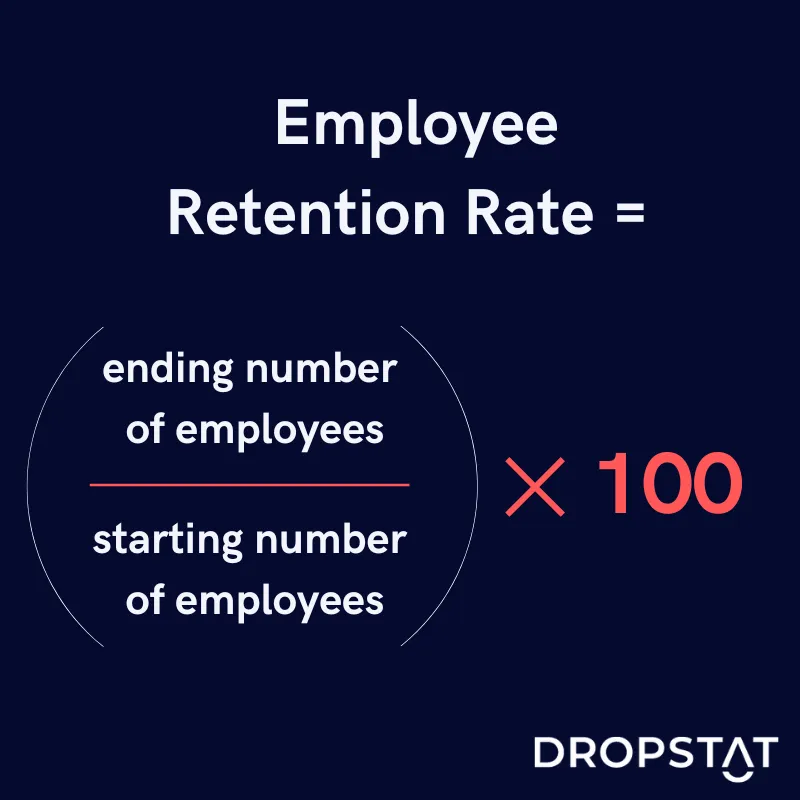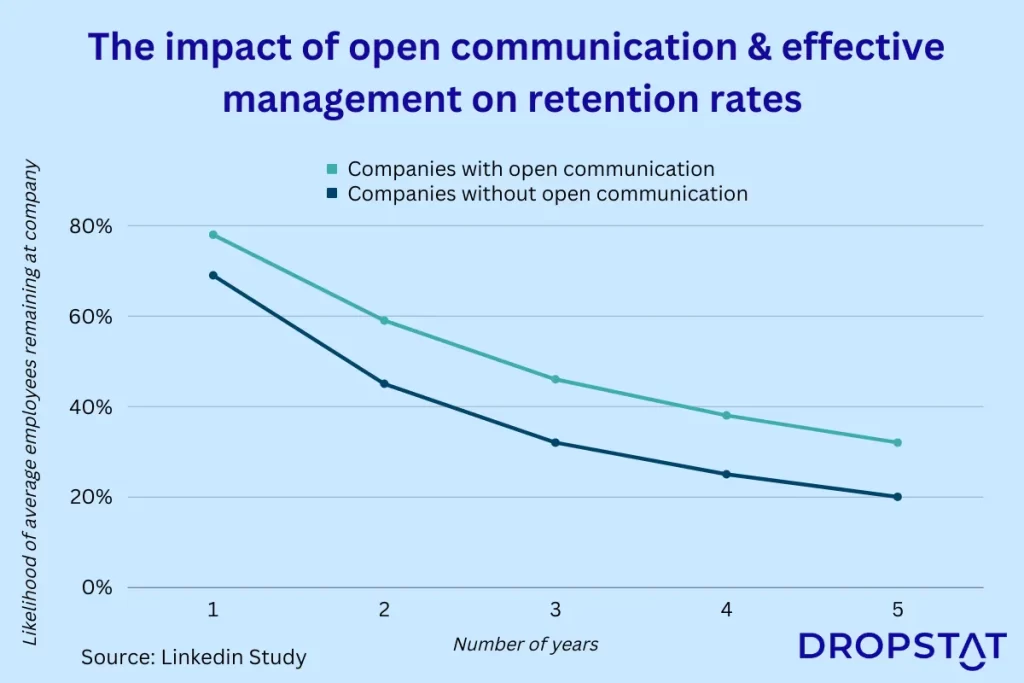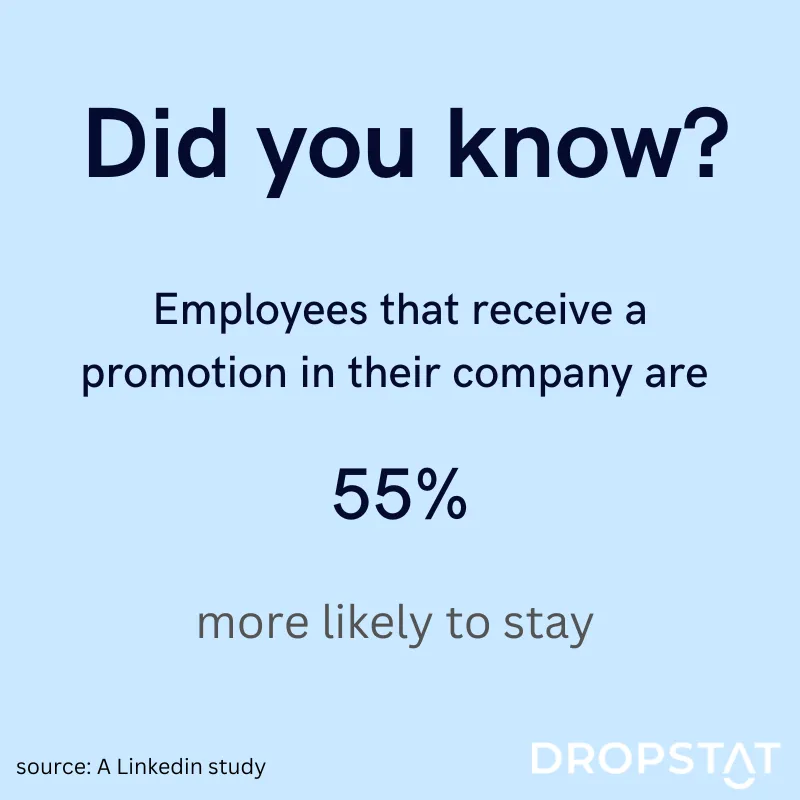What is nursing retention, and why is it important?
Nurse retention refers to an effort to retain the employees currently working for your facility. Low employee retention means high nurse turnover rates and a constant hire-burn-churn cycle. This vicious cycle is not only frustrating, but it is also a significant drain on profitability. On the opposite end of the spectrum, high nurse retention rates are indicators of a positive work environment, increased job satisfaction, and good predictors of productivity and patient satisfaction. Happy employees are motivated employees who love their jobs and perform them well. By improving nurse retention, healthcare facilities can see significant reductions in turnover costs and considerable gains in positive patient outcomes and satisfaction.
How to calculate your employee retention rate
Before making adjustments to improve, it’s essential to understand your facility’s current nurse retention metrics. Decide the period for which you want to calculate retention. Generally, this data is most useful when the period is set to one year. Divide the number of employees at the end of the chosen period by the number of employees at the start. Then multiply this number by 100. Now you have a baseline nurse retention rate to work with.
This simple employee retention calculation makes it easy to gauge your facility’s nurse retention rate and compare your performance with rival facilities.

6 strategies to improve nurse retention
Nurse retention is an essential foundation for successful healthcare facility operations. Without a highly motivated and collaborative staff, turnover risks increase exponentially, and patient care begins to suffer. There are several key strategies that leadership and management can implement to reinforce employee engagement and retention among their nurses.
- Provide growth opportunities
- Create a comprehensive and effective onboarding process
- Develop an environment open to feedback and continuous improvement
- Assess skill level and organizational compatibility when hiring new employees
- Employee recognition
- Keep employees up to date on changes within the facility in advance
1. Growth opportunities to increase retention
When employees are aware that they have opportunities for growth in their company through promotions or other positions, they are more likely to invest in their performance instead of looking for other jobs that offer better positions. One way to promote growth in your company is to provide cross-training. This gives nurses greater flexibility in job opportunities and advancement.
2. Enhance nursing retention through comprehensive onboarding processes
An organization’s first impression is critical to every employee’s outlook on the company’s culture. While onboarding should focus on the technical aspects of employee responsibilities, it should also introduce staff to a strong and supportive culture. Survey data from employees concluded that maintaining a positive relationship with co-workers is one of the most valued aspects of a work environment and significantly increases productivity.
3. Develop an environment of open communication & feedback
When employees are active in organizational improvement, they feel their perspectives and experiences within the company are valued. One practical technique to ensure this happens is to encourage weekly feedback from staff and identify the improvements that will be implemented to address concerns and support effective processes. Both positive and negative feedback is essential to improving retention.

4. Assess organizational compatibility and skill level through the hiring process:
Many applicants that may seem qualified for a position are not necessarily the best fit in terms of the broader company culture. Similarly, a candidate that encompasses the company’s values will not automatically possess the required skills for the job’s demands. If staff lack the necessary technical skills, overall efficiency decreases, and other nurses must fill in the gaps, which increases their workload. Identify candidates that align with your organization’s culture and can improve their skills through training and development. This allows employees to identify growth opportunities while fostering greater confidence in management, leading to reduced turnover rates and costs when hiring.
5. Provide employee recognition
Positive feedback drives motivation and productivity. A LinkedIn study found that receiving a promotion increased retention for three years by 55%. Rewards programs also provide a platform to recognize loyalty and improve employee satisfaction, increasing nurse retention. It is important to note that rewards specific to each employee are more effective at strengthening the overall sense of appreciation.
6. Update employees on internal organizational changes
When management prioritizes validating employee feedback in operations and includes nursing staff in organizational changes, the positive outlook on leadership increases. Typically, nurses want to feel like they know the trajectory of the company that they’re working for. When changes are underway, ensure that management takes the time to address all questions and concerns and update nurses sooner rather than later, this gives staff a sense of trust and belonging.

How Dropstat can increase employee retention in healthcare facilities
Dropstat uses employee-centered retention strategies to help healthcare facilities retain the nursing talent they have. Firstly, Dropstat oversees project management and provides scheduling guidance to ensure a smooth and streamlined onboarding process. The user-friendly interface allows nurses to easily pick up shifts that fit their schedules while enabling schedulers to approve shifts in a more time and cost-effective manner. This enhances the scheduling process for nurses and allows each nurse to work the shifts that best align with their skillset and scheduling preferences.
Workforce analytics also plays a crucial role in the initial hiring process by predicting future staffing demands. When facilities have a better concept of the skills and shifts that are lacking, finding applicants who will fill those demands becomes much easier.
Another component of Dropstat’s employee-centered processes includes alerting schedulers about overtime. Overtime and unsustainable working conditions are the leading cause of turnover. With Dropstat’s workforce analytics, schedulers can spot burnout-related employee behavior to assist employees and increase retention.
As mentioned previously, acknowledging your employees’ work creates a basis for employee satisfaction, increasing productivity and retention. Implementing Dropstat’s integrated rewards system boosts engagement and promotes a healthy work-life balance. Schedule a demo today to start using Dropstat’s nursing retention strategies.






